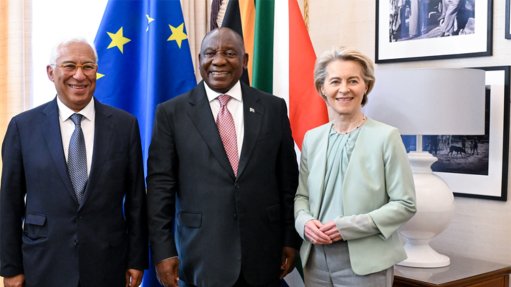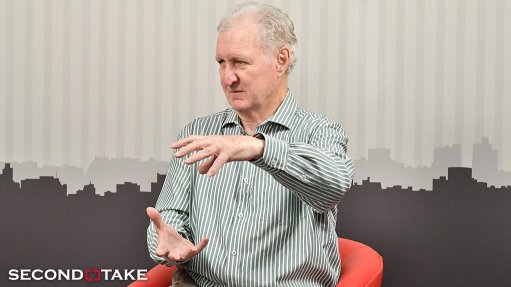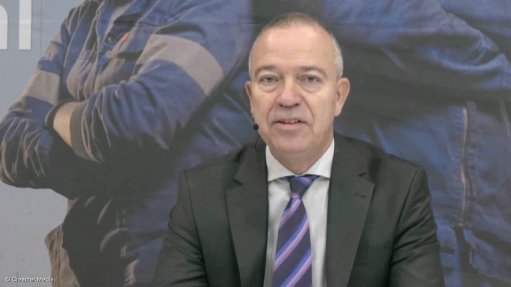E-waste now the fastest growing waste stream globally
Electronic waste (e-waste) has become the fastest-growing form of waste worldwide, as consumers shed more than 50-million metric tonnes of e-waste each year – equating to about 7 kg of e-waste a person – with only 17% properly recycled.
Most e-waste is either dumped, burnt or unaccounted for, potentially releasing harmful toxins into the environment and communities and emitting carbon and other gases that contribute to global warming.
Should consumption remain the same with no action taken, this will double by 2050, according to the United Nations (UN) Environment Programme.
Technology is already an indispensable tool for businesses and individuals, and it is rapidly evolving to offer even more capabilities and provide solutions to global challenges, such as climate change resilience and sustainable socioeconomic development, says Vodacom Group chief regulatory and external affairs officer Stephen Chege.
“With this increasing reliance on technology comes a growing responsibility – the mounting issue of e-waste.”
In Africa, infrastructure for environment- friendly e-waste management lags other parts of the world.
While Africa generates 2.9-million tonnes of e-waste a year, equating to just under 2kg a person – excluding e-waste illegally imported from developing countries – only 1% is formally collected and recycled.
According to the International Telecommunication Union, $3.2-billion of raw materials are contained in the e-waste generated in Africa, which is a significant amount of lost economic value, with a cost incurred for both the environment and society.
However, the private sector has a significant role to play in addressing the e-waste crisis.
“In particular, technology companies are not only major producers and users of electronics, from network equipment to devices, but also wield substantial influence over consumer behaviour,” says Chege.
He points to research that shows that circular business models are gaining traction in the industry, with 90% of global telecommunications operators believing the circular economy is important to their organisation and 89% saying that it is part of their current business strategy.
“As the technology value chain is complex, collaboration between the private and public sectors is essential if we are to implement circularity initiatives, which will help to reduce the negative environmental impact of e-waste and create a more sustainable future,” he continues.
Among the initiatives that can bolster the adoption of a circular economy-focused business model and the transition into a circular economy is ensuring the longevity of electronics, extending the life span of equipment and devices and preventing waste.
Technology companies have the opportunity to proactively engage and partner with manufacturers and suppliers to improve the ecodesign and sustainable production of electronics, as well as pursue partnerships with recyclers, repairers and waste management operators to ensure a circular flow of electronics.
This will lead to greater repairability, durability, recyclability and a longer life span, Chege comments.
Recycled content can be used in devices, such as the Eco-SIM, a half-sized SIM card made of recycled plastic, while other initiatives include implementing technologies to remove the need for these materials, such as the e-SIM, which can reduce the environmental impact of manufacturing and transporting physical SIM cards.
Another key component to solving the e-waste problem is consumer behaviour and driving awareness about sustainability and introducing incentives for take-back schemes and refurbished devices, which can increase the longevity of electronics.
Further, waste disposal management programmes that focus on resale and redeployment of network and information technology equipment can be implemented.
“Once the life span of this equipment is exhausted, it can be recycled responsibly using approved recycling agencies. Obsolete batteries, classified as hazardous waste, can go to a licensed facility for incineration. In this way, network equipment can be diverted from landfill sites and not harm the environment,” he continues.
In addition, regulation can promote sustainability in design and manufacturing through material and process requirements for electronics, tax and subsidies.
“Regulation, such as South Africa’s extended producer responsibility scheme, can also be a positive step to support the circular economy while strengthening the resilience and scalability of e-waste initiatives.”
However, effective policies targeting e-waste require knowledge sharing by all stakeholders across the value chain and addressing current data gaps in e-waste streams for better decision-making, he says.
“If we are to alleviate the enormous challenge of e-waste and reduce its impact on the environment and human health, we need to come together to drive real change.
“By promoting a circular economy and collaborating across the value chain, we can ensure the digital revolution is not just a leap forward in technology but also a leap forward in environmental consciousness and responsibility.”
Chege highlights the various e-waste initiatives Vodacom, Vodafone and various subsidiaries are involved in.
One such initiative in Egypt is a partnership among Vodafone Egypt, the Egyptian Ministry of Environment, the UN Development Programme and the Federation of Egyptian Industries to develop the e-TADWEER digital platform.
Launched in April 2021, the platform encourages citizens to recycle old electronic devices safely through awareness campaigns and discounts and vouchers in exchange for products, with 70.8-million tonnes of e-waste, equivalent to 390 000 midsized cars, having been recycled since.
In Kenya, Safaricom partnered with the Waste Electrical and Electronic Equipment Centre and the National Environment Management Authority to create an e-waste management programme to enable customers to deposit used electronic equipment at any of Safaricom’s retail centres and offices countrywide.
Comments
Press Office
Announcements
What's On
Subscribe to improve your user experience...
Option 1 (equivalent of R125 a month):
Receive a weekly copy of Creamer Media's Engineering News & Mining Weekly magazine
(print copy for those in South Africa and e-magazine for those outside of South Africa)
Receive daily email newsletters
Access to full search results
Access archive of magazine back copies
Access to Projects in Progress
Access to ONE Research Report of your choice in PDF format
Option 2 (equivalent of R375 a month):
All benefits from Option 1
PLUS
Access to Creamer Media's Research Channel Africa for ALL Research Reports, in PDF format, on various industrial and mining sectors
including Electricity; Water; Energy Transition; Hydrogen; Roads, Rail and Ports; Coal; Gold; Platinum; Battery Metals; etc.
Already a subscriber?
Forgotten your password?
Receive weekly copy of Creamer Media's Engineering News & Mining Weekly magazine (print copy for those in South Africa and e-magazine for those outside of South Africa)
➕
Recieve daily email newsletters
➕
Access to full search results
➕
Access archive of magazine back copies
➕
Access to Projects in Progress
➕
Access to ONE Research Report of your choice in PDF format
RESEARCH CHANNEL AFRICA
R4500 (equivalent of R375 a month)
SUBSCRIBEAll benefits from Option 1
➕
Access to Creamer Media's Research Channel Africa for ALL Research Reports on various industrial and mining sectors, in PDF format, including on:
Electricity
➕
Water
➕
Energy Transition
➕
Hydrogen
➕
Roads, Rail and Ports
➕
Coal
➕
Gold
➕
Platinum
➕
Battery Metals
➕
etc.
Receive all benefits from Option 1 or Option 2 delivered to numerous people at your company
➕
Multiple User names and Passwords for simultaneous log-ins
➕
Intranet integration access to all in your organisation


















